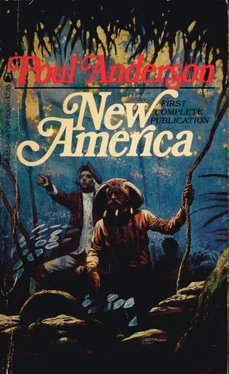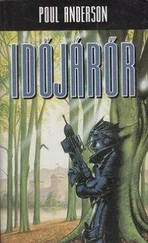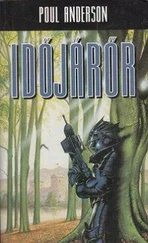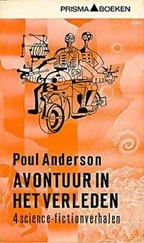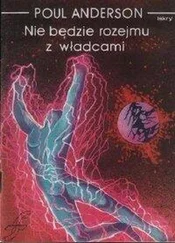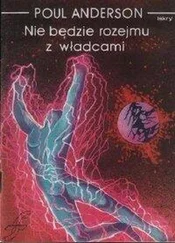“The point is, they are alien.
“Shall we, who still dwell precariously on a world that is still full of deadly surprises, shall we take upon ourselves such a burden of unassimilable outsiders?”
O’Malley lowered his voice. Almost, it tolled into the hush: “Would that actually be a kindness to the outsiders themselves? I have pointed out that they are a potential poverty class. I will now point out that since they are alien, since there are bound to be offenses and clashes, they could become the victims of hatred, even outright persecution. We are not saints on Rustum. We are not immune to the ancient diseases of xenophobia, callousness, legalized robbery, and mob violence. Let us not inflict upon our home the same unhealable wound which was inflicted on Mother America.
“Lead us not into temptation.”
He stepped down to such applause, from the mostly highlander congress, that Hirayama could barely be heard: “We will take a half hour’s recess.”
Coffin stood with his pipe, though smoke had scant taste in air this keen, on an upstairs balcony. Anchor gleamed and murmured beneath, busy at its work, its hopes. Its radiance dimmed, in his vision, the ice on the river, the reaching snow-lands, the peaks and the stars above them. But I only have to walk a jew kilometers out , he thought, and I’ll be alone with the unhuman and its eternity.
I’m also close to them in time, of course , his mind added. Soon I’ll be among them . It was a strange feeling.
A voice brought him around. “Ah, greetings, Daniel. Did you want to escape the crowd?”
He saw Morris O’Malley’s ascetic visage between the street lamps and the moons. “Yes,” he replied; the mist of his words fled away into night. “Say, that was a fine speech you made. To be quite frank, better than I expected.”
The other man smiled. “Thanks. I’m no Demosthenes. But when you speak from conviction, it gets easier.”
“Those are your beliefs?”
“Of course. I have no personal ax to grind. I may live to see that fleet arrive, but before the trouble becomes acute, I’ll be safe in my grave. It’s my grandchildren I’m worried about.”
“Do you really think they’ll have that much grief from a bunch of well-meaning Asians or Africans or whatever those are? This is a whole planet, Morris.”
O’Malley’s voice turned bleak. “For your kind it is.”
“It was for your granddad too, in spite of his having to wear a reduction helmet—one of those primitive muscle-powered jobs—every time he ventured below three kilometers.”
“He helped map the lowlands. He didn’t live in them. We, confined to High America—” The talk he had given made it less astonishing than it would formerly have been, that dry Dr. O’Malley laid a hand on Coffin’s shoulder. “Daniel, I know I was oversimplifying. I know the issues are much more subtle and complicated, with far more ifs and maybes. That’s precisely what scares me.”
Coffin drank smoke and looked across rooftops. “Your granddad never let anything scare him, permanently anyway, that I know of.”
“Things were different then. Simple issues of survival.”
“I have a notion that, at bottom, all issues are alike. They turn on the same principles. And, for your information, survival wasn’t always a simple either-or question.”
O’Malley was mute for a while before he said low: “I’m told you’re to speak just after recess.”
Coffin dipped his head. “It won’t take as long or be near as eloquent as yours, Morris.”
How many of their faces he knew! There was the mother of Leo Svoboda, there the son of Mary Sandberg, there his old poker opponent Ray Gonzales, there young Tregennis who’d worked for him before seeking a fortune in the western islands, there his and Eva’s son Charlie whom Tom and Jane de Smet had raised because he couldn’t live in the lowlands, his own hair grizzled…. Rustum was mystery and immensity, to this day; but man on Rustum remained a world very small and close and dear to itself.
“This is not exactly a committee report,” Coffin said. “I represent the Moondance area, and because we thereabouts have reached a sort of consensus, I asked leave of the president to set our views before you.”
His throat felt rough. Like his predecessor, he took a drink. He recognized the water; its faint iron tang brought him back to springs near the farm on the Cleft edge when he was a child. How much of everything he had known could he hope to pass on?
“I’ll try to be brief,” he said, “because my esteemed colleague Dr. O’Malley has covered the generalities, leaving the practicalities to me. Mind you, philosophy and theory are essential. Without them, we blunder blind at best, we’re brutes at worst. But they are not ends in themselves; that’d make them mere parlor games. They are guides to action. Life depends on what we do —or don’t do.
“Shall we or shall we not receive strangers into our midst? I propose we answer the question fast, in practical terms, and get on with our proper business.”
He had them, he saw. He was no longer an old man allowed to drone on a while out of respect for what he had been; suddenly he gripped reality in the sight of them all.
“As for the problem that’d be created for High America if we admit outsiders,” he said, taking advantage of his lack of oratorical ability to convey a sense of unemotional confidence: “many of you have been assuming that the highlanders would have to cope with it alone. Why should we lowlanders care? If so, I can sympathize with highlanders who want to use the majority they still will have when the ships come, to forbid them to land any passengers.
“Well, I am here to tell you that Lake Moondance and environs, clear through the Cyrus Valley, does care and wants to help.” He heard the breath sigh into fifty pairs of lungs. No doubt it was doing so around the planet. Inwardly, he grinned. Half his effort had gone toward keeping this revelation secret, that he might spring it tonight for top effect.
The other half had gone into argument, cajolery, chicanery, and genteel bribery, to get the support that he must have.
“I expect our sister lowland communities will follow suit,” he continued, thereby going a ways toward committing them. “Frontiersmen are generally pragmatists. They have ideals, but their first thought is what material measures will put those ideals to work.
“In this case, the practical problem is that High America would find it difficult, maybe impossible, from both an economic and a social viewpoint, to take in five thousand persons of exotic background, who can’t scatter across the globe and get absorbed, but must stay here where they can breathe.”
Coffin reached for pipe and tobacco pouch. He didn’t really want a smoke this soon after the last; but the homely action of filling the bowl should help bring everything down to a less giddily exalted plane.
“Now that ought to be solvable,” he drawled. “As for the cost, why, Moondance is ready to pay a fair share in money, materials, labor, whatever is needed that we can supply. I repeat, I’m sure the other lowland communities will join us in that. Shared, the expense won’t fall hard on anybody.
“And you know, that’ll be an important precedent, a symbol and function of our unity. I hate to contradict Dr. O’Malley’s noble disclaimer, but the fact is, we do have basic differences among us, not only social but actually genetic, racial. Some of us can live down there, some cannot. We must find as much common human ground as we can, to transcend that. Don’t you agree?”
After a wait: ” ‘Common human ground’ includes the good old Homo sapiens habit of not meekly adapting to circumstances, but grabbing them by the ears and adapting them to us.
Читать дальше
